They're Humphrey's, but they're pink because he got in the 30s.For whom did the pink states go?
You are using an out of date browser. It may not display this or other websites correctly.
You should upgrade or use an alternative browser.
You should upgrade or use an alternative browser.
Alternate Electoral Maps II
- Thread starter Aaaaasima
- Start date
- Status
- Not open for further replies.
Threadmarks
View all 43 threadmarks
Reader mode
Reader mode
Recent threadmarks
Pericles-Obama landslide in 2008 Pericles-Obama does better in 2012 Tex Arkana-Carter runs a better campaign in 1976 and picks Frank Church as his running mate, winning in a landslide. DPKdebator-Trump landslide in 2016 wildviper121-Trump landslide based off of someone's Campaign trail game DPKdebator-The worst you can do as Hillary Clinton in the campaign trail game TheSaint1950-Last gallup poll in 1948 is right jonnguy2016-Trump self-sabotageThey're Humphrey's, but they're pink because he got in the 30s.
Ah, I see.
Could anyone try to make a county map for if the Democratic nominee won a majority of counties in every state?
So, 67 in Virginia, 12 in Wyoming, and so on.
So, 67 in Virginia, 12 in Wyoming, and so on.
Humphrey. He wins those with a 30-40% plurality.For whom did the pink states go?
Very interesting map! I'd love to see more.Can't Keep Cool in 1928, Wedith a Twilsont
Pulled from an old Boston Globe article; here's an extended prediction from Hugh Campbell Wallace Ambassador to France in the final years of the Wilson administration. Dated Oct. 27, 1927.
Supposedly the addition of Edith Wilson would "keep the South solid and insure the Democrats several western states (which Wallace goes on to list and I've highlighted)". Al Smith would "contribute his part in the victory by carrying the East". I tacked Smith's home state of New York on in light of this, since it gives the ticket a narrow win and Amb. Wallace couldn't know how Smith would perform.
If someone has a good source on women voters by state and party at the time; another possible map could be based on Wallace's assertion that "The Democratic party gave women suffrage to the country and [the only female Govs. and Sens. have been Democrats]... women resent being ignored by the Republicans and I am sure at least 10 percent of Republican women voters would be glad [to elect a female VP]...especially one as well versed in statecraft as Mrs. Wilson."
Thanks, I have access to the full Boston Globe archives from 1872-1985 and The New York Times from 1851-2013, so there's plenty of speculation from different figures to draw from. Anything more on that specific scenario I would need to come up with myself, but there are others I could do.Very interesting map! I'd love to see more.
Right now I'm focused on pulling out as many scenarios as I can and seeing if there's enough to make something larger out of it; not necessarily a timeline, but maybe a series of SW polls or some PI/P4E'04 scenarios with all of these alternate candidates and parties.
My favorite so far is also in 1928; with a Democratic split over Prohibition leading to a "Wet" Al Smith ticket and a "Dry" ticket led by Ohio Gov. Vic Donahey. I just need to figure out whether they'd both appear on the ballot nationwide (making it a 3-way race) or if certain states would pick one to be the official Democratic candidate (like some southern states did with Thurmond in '48).
I wonder if there was any movement IOTL to do a splinter ticket that election. I feel like nobody high profile particularly wanted to implode their career to run one (with James Heflin of Alabama coming the closest by endorsing Hoover which almost swung Alabama red). Maybe the Prohibition Party candidate could have gotten more support if maybe they had gotten more high profile nominee like Upshaw? I can't imagine a splinter ticket winning any states though.My favorite so far is also in 1928; with a Democratic split over Prohibition leading to a "Wet" Al Smith ticket and a "Dry" ticket led by Ohio Gov. Vic Donahey. I just need to figure out whether they'd both appear on the ballot nationwide (making it a 3-way race) or if certain states would pick one to be the official Democratic candidate (like some southern states did with Thurmond in '48).
Stand up for America
The first upset of the 1968 election came when incumbent president Lyndon B. Johnson's announced that he would not be seeking re-election. This is attributed to the successes of anti-war Democrats Eugene McCarthy and Robert F. Kennedy, who seriously challenged Johnson, as well as the president's poor health. The party tumbled into factionalism, split between intellectual-backed McCarthy, minority-favorite and Kennedy, Southern Democrat Happy Chandler, and Vice President Hubert Humphrey. Kennedy and Humphrey were the strongest, and Humphrey just managed to squeak by thanks to McCarthy and Kennedy splitting the anti-war vote. This division was broacasted world-wide at the violent Chicago Democratic Convention. Anti-war protesters, emboldened by McCarthy and Kennedy, were violently beaten by Chicago police. Humphrey attempted to heal the party by offering the VP position to McCarthy and Kennedy, but both refused. Instead, moderate Edmund Muskie is selected.
Meanwhile, the Republicans were experiencing a similar, yet weaker divide. Front-runner Richard M. Nixon was challenged by anti-war George W. Romney, liberal Nelson Rockefeller, and conservative Ronald Reagan. Nixon has the party bosses behind him, but a Stop-Nixon team provides a strong threat before they're split up. Nixon considered hunting for a Southerner VP to gain votes in the South, but preferred his close friend Robert Finch instead, who accepted.
Something darker lurked in the old Confederacy, however. For years anti-segregationist George Wallace has stoked the flames of racism and populism, condemning the Civil Rights movement. Now was his time. First Strom Thurmond, then Harry F. Byrd... Wallace saw a demand for what he could offer. The two major parties, Wallace explained, were fundamentally the same. And hell, obviously Wallace couldn't win outright, but if he managed to split the vote enough he could get the top man to give him whatever concessions he wanted in exchange for support. That was power. And who best to share the American Independent Party with? Why not Happy Chandler? The baseball commissioner who let Jackie Robinson play, and a man who supported integration. Chandler had a record of moderation when it came to Civil Rights, which was exactly enough to convince people that the Wallace ticket wouldn't be that extreme, while remaining exactly little enough to keep Wallace voters on his side. While they may not like it, they'd have to suck it up. Wallace launched his campaign confidently.
The election season saw Nixon's failed Southern Strategy. Southern Democrats, defecting from Humphrey, were warming up to the Wallace-Chandler ticket, and would sooner vote for them over Nixon. Additionally, many union members and blue-collar voters also turned to Wallace thanks to his strong condemnation of 'concentrated wealth' and the 'liberal elite' who didn't have to deal with weak police forces and school busing. Wallace seized the 'law-and-order' crown thanks to his criticism of the riots and violence of the past decade. Many Nixon law-and-order voters began to sympathize with Wallace after Wallace's supporters were attacked by rioters in Madison Square Garden, leading to several deaths before police took control of the situation. Additionally, Wallace supported an escalation of the Vietnam War, saying that the previous Democrat and Republican presidents were cowards who were afraid of rolling up their sleeves. Nixon wouldn't win the war because he'd never been in true combat, and Humphrey was a draft dodger who supported draft dodgers. The pro-war vote began to wonder why they'd vote for Nixon over Wallace. Humphrey's campaign, meanwhile, was hobbled by anti-war protesters. Desperate, Humphrey condemned some of Johnson's war policies, which was followed by a stiff Johnson defense that embarrassed Humphrey and cost his campaign, especially in Texas. Many whispered that Johnson would vote for Nixon. Wallace's support, stronger than ever in the old Confederacy, began to seep outwards....
Then came the November Surprise of 1968. By now Nixon was in the lead, followed by Humphrey, followed closely by Wallace. Humphrey was worried that pacifists would sit out because his war policies and the union vote would be stolen by Wallace. Johnson and Humphrey planned a bombing halt and an announcement of a future peace, convincing the anti-war vote and beating Nixon in an October Surprise. Nixon was informed by this by a White House insider. He refused to lose another election, instead making contact with the South Vietnamese government and offering a better peace deal if they held off until after the election. Johnson, having been informed of this thanks to the NSA's wiretapping of South Vietnamese communications and members of the Nixon campaign, told Humphrey. Humphrey, desperate, immediately leaked it to the press one week before the election, qualifying as a November Surprise.
Nixon's campaign collapsed. Every newspaper and every newscaster condemned these "borderline treasonous" actions. The Republican Party countered by saying that, while Nixon's actions were unethical, they sure as hell weren't treasonous. Furthermore, how the hell did Humphrey find out? Did the President wiretap Nixon's campaign? The GOP's counterattack is drowned out, however, by the Nixon controversy.
A mass defection of Nixon-supporters followed. Some to Humphrey, but most to Wallace, who declared Nixon's actions "typical" of the corrupt establishment Nixon was part of. He also condemned the Democrats, LBJ, Humphrey for "obviously spying on Nixon's campaign, which is typical of the liberal elites."
Then came election day:
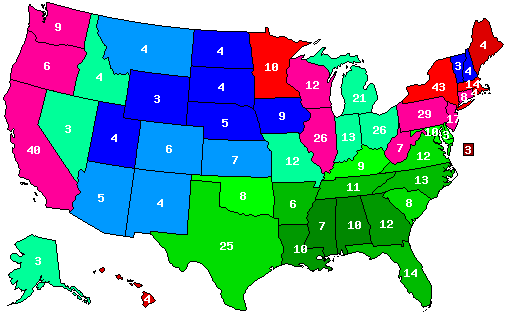
---- George Wallace / Happy Chandler -- 240 -- 26,144,116 -- 35.41%
---- Hubert H. Humphrey / Edmund Muskie -- 237 -- 24,849,340 -- 33.65%
---- Richard Nixon / Robert Finch -- 61 -- 22,844,259 -- 30.94%
In the largest political upset since 1824, the two major parties had been cast aside in favor of a third candidate--however, none won an Electoral majority. This sent the election to the newly elected House of Representatives (now slightly less blue) for a state bloc Contingent Election. Republicans and Democrats panicked at the prospects of a third party winning the Presidency, let alone the White House. Americans, meanwhile, were stunned and horrified over the events of the last week. This was not how elections worked--this was not how candidates acted!
The GOP insisted that Democrats should vote for Nixon because he was the 'moderate' of the election even if he did come in last and even if he might be a little unethical. Democrats insisted that Republican states vote for Humphrey because his larger Electoral vote win and 3% popular vote advantage. Meanwhile, Southern Democrats, excited by the opportunity that Wallace presented, refused to support the 'social engineer' Humphrey, while boundary states refused because Humphrey was a 'pseudo-intellectual elitist.' Most importantly, nobody was ready to vote against what their state had decided. In this election, when partisanship has spiked, anybody who votes for the other party would have to answer to the people whose vote they betrayed. Of course, Nixon was especially controversial, so many Republican Congressmen voted for Humphrey anyways, giving Colorado and Montana over to the Democrats.
First Contingent Election:
---- George Wallace -- 22 states
---- Hubert H. Humphrey -- 17 states
---- Richard Nixon -- 11 states
While Wallace won the plurality of states, he failed to get the 26 necessary to win. Democrats and Republicans took a breath. Wallace still hasn't won; if the two parties can negotiate, they would stop him.
Meanwhile, the Senate contingent election between Happy Chandler and Edmund Muskie (only the top two candidates are allowed, disqualifying Finch), resulted in a Muskie victory over Chandler. While Chandler is a better choice than Wallace, many can't help but feel that voting for one is like voting for the other. Furthermore, Muskie wasn't that bad. He had been in Congress for almost a decade and had been a governor before that. While Republicans and Muskie had disagreement, those were eased when Muskie offered concessions and cooperation as Vice President. Muskie won.
In the days afterwards, Humphrey campaigned madly for Republicans, offering concessions, cooperation, and moderation like Muskie had done. By the second contingent election, Humphrey had successfully won over several more Republican states where he had come in second place. He is also boosted by anti-war Democrats finally warming up to him--exemplified by the endorsements of McCarthy and Kennedy. Wallace's populist rhetoric, meanwhile, did not win over those he was condemning in the House.
Second Contingent Election:
---- George Wallace -- 22 states
---- Hubert H. Humphrey -- 22 states
---- Richard Nixon -- 6 states
A third contingent election was not organized in time for January 20th, leading to Edmund Muskie being sworn in as Acting President. This strengthened the Democratic cause.
Meanwhile, the country was growing impatient and frightened. They had seen a major presidential candidate, and to some a national hero being revealed as a traitor, they had seen protests turn into violent riots. In the south, protesters demanded that Wallace be rightly awarded the White House. Republicans, unsure of their candidate, began to shift away and demand their Representatives vote for Humphrey.
Humphrey had momentum. He was gaining reluctant states, and was inching ever-closer towards 26....
Then, on the morning of February 3rd, 1969, Hubert Humphrey was shot. Four hours later he was pronounced dead. The nation watches in shock and grief as the assassin is hunted for by police. Thousands take to the streets, blaming Wallace for Humphrey's death and demanding he end his campaign. The police hunt for the assassin, finding him the next day. He is revealed to be Arthur Herman Bremer, a young man from Wisconsin. A diary, containing similar plans to kill Nixon and Wallace, is found on his person. Conspiracy theorists declare that Bremer was an agent of some nefarious force, the same nefarious force that killed JFK and MLK. Wallace declared his sympathy for Humphrey's family, and condemned the use of violence to forwards political aims, as he has "always condemned."
A constitutional crisis began as the third contingent election approaches. Can Representatives vote for Humphrey, even if he is dead? An Electoral Commission was quickly created to vote on the issue, and they decide that no, the House cannot vote for a dead man--just as the Electoral College cannot.
The third Contingent Election (delayed for the Electoral Commission) then became a competition between Wallace and Nixon, considering that there is no third winner of any electoral votes (the Democrats cringe at this point--they'd suppressed a faithless elector for Robert F. Kennedy in New York). Acting President Muskie met with Nixon, offering to back Nixon if Nixon were to resign immediately after being sworn-in. Nixon refused; he didn't believe his sabotage was an impeachable offense and wasn't going to ruin his second presidential run now that he had a legitimate chance at becoming president. Nixon may have been a traitor, may have sabotaged Humphrey's campaign... but he wasn't Wallace. Muskie relents, saying that he expected concessions from Nixon instead. Nixon agreed, and announced he'll cooperate closely with Vice President Muskie, as well as Democrats. This is enough for the Northern Democrats who couldn't stand Wallace to back Nixon completely. If he isn't impeached, they get someone in the White House who owes them one. If he is, they get a Democrat and the Republicans look bad. What's to lose? Not all Democrats see it like this, however. Many Congressmen despise Nixon too much, and instead refuse to vote. Additionally, Wallace's rhetoric struck a chord with Americans, and Nixon has become part of the corrupt establishment everyone despises. Why would you vote for a man like Nixon, when Wallace was right there....
Third Contingent Election:
---- George Wallace -- 26 states
---- Richard Nixon -- 24 states
Notably, while Wallace may have won by 2 states, he only won by five actual votes within those states. Wallace won the third contingent election, and became President-Elect of the United States of America. On February 20th, 1969, George Wallace was sworn in as the 37th President of the United States of America as Edmund Muskie was sworn in as the 39th Vice President. The inauguration parade is split between supporters and protesters, who are split by thousands of policemen.
In his inauguration address, Wallace announced a new era of American history. Not one run by the liberal elites, or the corrupt establishment, or coward academics--no, by real Americans, working-class Americans, the white majority of Americans who understood tradition and what it truly meant. Wallace announced a new era for states rights, a new era without social engineering--a new era for America and for Americans.
And America watched on with horror and with joy.
inspired by: https://www.americanhistoryusa.com/campaign-trail/game/407696
The first upset of the 1968 election came when incumbent president Lyndon B. Johnson's announced that he would not be seeking re-election. This is attributed to the successes of anti-war Democrats Eugene McCarthy and Robert F. Kennedy, who seriously challenged Johnson, as well as the president's poor health. The party tumbled into factionalism, split between intellectual-backed McCarthy, minority-favorite and Kennedy, Southern Democrat Happy Chandler, and Vice President Hubert Humphrey. Kennedy and Humphrey were the strongest, and Humphrey just managed to squeak by thanks to McCarthy and Kennedy splitting the anti-war vote. This division was broacasted world-wide at the violent Chicago Democratic Convention. Anti-war protesters, emboldened by McCarthy and Kennedy, were violently beaten by Chicago police. Humphrey attempted to heal the party by offering the VP position to McCarthy and Kennedy, but both refused. Instead, moderate Edmund Muskie is selected.
Meanwhile, the Republicans were experiencing a similar, yet weaker divide. Front-runner Richard M. Nixon was challenged by anti-war George W. Romney, liberal Nelson Rockefeller, and conservative Ronald Reagan. Nixon has the party bosses behind him, but a Stop-Nixon team provides a strong threat before they're split up. Nixon considered hunting for a Southerner VP to gain votes in the South, but preferred his close friend Robert Finch instead, who accepted.
Something darker lurked in the old Confederacy, however. For years anti-segregationist George Wallace has stoked the flames of racism and populism, condemning the Civil Rights movement. Now was his time. First Strom Thurmond, then Harry F. Byrd... Wallace saw a demand for what he could offer. The two major parties, Wallace explained, were fundamentally the same. And hell, obviously Wallace couldn't win outright, but if he managed to split the vote enough he could get the top man to give him whatever concessions he wanted in exchange for support. That was power. And who best to share the American Independent Party with? Why not Happy Chandler? The baseball commissioner who let Jackie Robinson play, and a man who supported integration. Chandler had a record of moderation when it came to Civil Rights, which was exactly enough to convince people that the Wallace ticket wouldn't be that extreme, while remaining exactly little enough to keep Wallace voters on his side. While they may not like it, they'd have to suck it up. Wallace launched his campaign confidently.
The election season saw Nixon's failed Southern Strategy. Southern Democrats, defecting from Humphrey, were warming up to the Wallace-Chandler ticket, and would sooner vote for them over Nixon. Additionally, many union members and blue-collar voters also turned to Wallace thanks to his strong condemnation of 'concentrated wealth' and the 'liberal elite' who didn't have to deal with weak police forces and school busing. Wallace seized the 'law-and-order' crown thanks to his criticism of the riots and violence of the past decade. Many Nixon law-and-order voters began to sympathize with Wallace after Wallace's supporters were attacked by rioters in Madison Square Garden, leading to several deaths before police took control of the situation. Additionally, Wallace supported an escalation of the Vietnam War, saying that the previous Democrat and Republican presidents were cowards who were afraid of rolling up their sleeves. Nixon wouldn't win the war because he'd never been in true combat, and Humphrey was a draft dodger who supported draft dodgers. The pro-war vote began to wonder why they'd vote for Nixon over Wallace. Humphrey's campaign, meanwhile, was hobbled by anti-war protesters. Desperate, Humphrey condemned some of Johnson's war policies, which was followed by a stiff Johnson defense that embarrassed Humphrey and cost his campaign, especially in Texas. Many whispered that Johnson would vote for Nixon. Wallace's support, stronger than ever in the old Confederacy, began to seep outwards....
Then came the November Surprise of 1968. By now Nixon was in the lead, followed by Humphrey, followed closely by Wallace. Humphrey was worried that pacifists would sit out because his war policies and the union vote would be stolen by Wallace. Johnson and Humphrey planned a bombing halt and an announcement of a future peace, convincing the anti-war vote and beating Nixon in an October Surprise. Nixon was informed by this by a White House insider. He refused to lose another election, instead making contact with the South Vietnamese government and offering a better peace deal if they held off until after the election. Johnson, having been informed of this thanks to the NSA's wiretapping of South Vietnamese communications and members of the Nixon campaign, told Humphrey. Humphrey, desperate, immediately leaked it to the press one week before the election, qualifying as a November Surprise.
Nixon's campaign collapsed. Every newspaper and every newscaster condemned these "borderline treasonous" actions. The Republican Party countered by saying that, while Nixon's actions were unethical, they sure as hell weren't treasonous. Furthermore, how the hell did Humphrey find out? Did the President wiretap Nixon's campaign? The GOP's counterattack is drowned out, however, by the Nixon controversy.
A mass defection of Nixon-supporters followed. Some to Humphrey, but most to Wallace, who declared Nixon's actions "typical" of the corrupt establishment Nixon was part of. He also condemned the Democrats, LBJ, Humphrey for "obviously spying on Nixon's campaign, which is typical of the liberal elites."
Then came election day:
---- George Wallace / Happy Chandler -- 240 -- 26,144,116 -- 35.41%
---- Hubert H. Humphrey / Edmund Muskie -- 237 -- 24,849,340 -- 33.65%
---- Richard Nixon / Robert Finch -- 61 -- 22,844,259 -- 30.94%
In the largest political upset since 1824, the two major parties had been cast aside in favor of a third candidate--however, none won an Electoral majority. This sent the election to the newly elected House of Representatives (now slightly less blue) for a state bloc Contingent Election. Republicans and Democrats panicked at the prospects of a third party winning the Presidency, let alone the White House. Americans, meanwhile, were stunned and horrified over the events of the last week. This was not how elections worked--this was not how candidates acted!
The GOP insisted that Democrats should vote for Nixon because he was the 'moderate' of the election even if he did come in last and even if he might be a little unethical. Democrats insisted that Republican states vote for Humphrey because his larger Electoral vote win and 3% popular vote advantage. Meanwhile, Southern Democrats, excited by the opportunity that Wallace presented, refused to support the 'social engineer' Humphrey, while boundary states refused because Humphrey was a 'pseudo-intellectual elitist.' Most importantly, nobody was ready to vote against what their state had decided. In this election, when partisanship has spiked, anybody who votes for the other party would have to answer to the people whose vote they betrayed. Of course, Nixon was especially controversial, so many Republican Congressmen voted for Humphrey anyways, giving Colorado and Montana over to the Democrats.
First Contingent Election:
---- George Wallace -- 22 states
---- Hubert H. Humphrey -- 17 states
---- Richard Nixon -- 11 states
While Wallace won the plurality of states, he failed to get the 26 necessary to win. Democrats and Republicans took a breath. Wallace still hasn't won; if the two parties can negotiate, they would stop him.
Meanwhile, the Senate contingent election between Happy Chandler and Edmund Muskie (only the top two candidates are allowed, disqualifying Finch), resulted in a Muskie victory over Chandler. While Chandler is a better choice than Wallace, many can't help but feel that voting for one is like voting for the other. Furthermore, Muskie wasn't that bad. He had been in Congress for almost a decade and had been a governor before that. While Republicans and Muskie had disagreement, those were eased when Muskie offered concessions and cooperation as Vice President. Muskie won.
In the days afterwards, Humphrey campaigned madly for Republicans, offering concessions, cooperation, and moderation like Muskie had done. By the second contingent election, Humphrey had successfully won over several more Republican states where he had come in second place. He is also boosted by anti-war Democrats finally warming up to him--exemplified by the endorsements of McCarthy and Kennedy. Wallace's populist rhetoric, meanwhile, did not win over those he was condemning in the House.
Second Contingent Election:
---- George Wallace -- 22 states
---- Hubert H. Humphrey -- 22 states
---- Richard Nixon -- 6 states
A third contingent election was not organized in time for January 20th, leading to Edmund Muskie being sworn in as Acting President. This strengthened the Democratic cause.
Meanwhile, the country was growing impatient and frightened. They had seen a major presidential candidate, and to some a national hero being revealed as a traitor, they had seen protests turn into violent riots. In the south, protesters demanded that Wallace be rightly awarded the White House. Republicans, unsure of their candidate, began to shift away and demand their Representatives vote for Humphrey.
Humphrey had momentum. He was gaining reluctant states, and was inching ever-closer towards 26....
Then, on the morning of February 3rd, 1969, Hubert Humphrey was shot. Four hours later he was pronounced dead. The nation watches in shock and grief as the assassin is hunted for by police. Thousands take to the streets, blaming Wallace for Humphrey's death and demanding he end his campaign. The police hunt for the assassin, finding him the next day. He is revealed to be Arthur Herman Bremer, a young man from Wisconsin. A diary, containing similar plans to kill Nixon and Wallace, is found on his person. Conspiracy theorists declare that Bremer was an agent of some nefarious force, the same nefarious force that killed JFK and MLK. Wallace declared his sympathy for Humphrey's family, and condemned the use of violence to forwards political aims, as he has "always condemned."
A constitutional crisis began as the third contingent election approaches. Can Representatives vote for Humphrey, even if he is dead? An Electoral Commission was quickly created to vote on the issue, and they decide that no, the House cannot vote for a dead man--just as the Electoral College cannot.
The third Contingent Election (delayed for the Electoral Commission) then became a competition between Wallace and Nixon, considering that there is no third winner of any electoral votes (the Democrats cringe at this point--they'd suppressed a faithless elector for Robert F. Kennedy in New York). Acting President Muskie met with Nixon, offering to back Nixon if Nixon were to resign immediately after being sworn-in. Nixon refused; he didn't believe his sabotage was an impeachable offense and wasn't going to ruin his second presidential run now that he had a legitimate chance at becoming president. Nixon may have been a traitor, may have sabotaged Humphrey's campaign... but he wasn't Wallace. Muskie relents, saying that he expected concessions from Nixon instead. Nixon agreed, and announced he'll cooperate closely with Vice President Muskie, as well as Democrats. This is enough for the Northern Democrats who couldn't stand Wallace to back Nixon completely. If he isn't impeached, they get someone in the White House who owes them one. If he is, they get a Democrat and the Republicans look bad. What's to lose? Not all Democrats see it like this, however. Many Congressmen despise Nixon too much, and instead refuse to vote. Additionally, Wallace's rhetoric struck a chord with Americans, and Nixon has become part of the corrupt establishment everyone despises. Why would you vote for a man like Nixon, when Wallace was right there....
Third Contingent Election:
---- George Wallace -- 26 states
---- Richard Nixon -- 24 states
Notably, while Wallace may have won by 2 states, he only won by five actual votes within those states. Wallace won the third contingent election, and became President-Elect of the United States of America. On February 20th, 1969, George Wallace was sworn in as the 37th President of the United States of America as Edmund Muskie was sworn in as the 39th Vice President. The inauguration parade is split between supporters and protesters, who are split by thousands of policemen.
In his inauguration address, Wallace announced a new era of American history. Not one run by the liberal elites, or the corrupt establishment, or coward academics--no, by real Americans, working-class Americans, the white majority of Americans who understood tradition and what it truly meant. Wallace announced a new era for states rights, a new era without social engineering--a new era for America and for Americans.
And America watched on with horror and with joy.
inspired by: https://www.americanhistoryusa.com/campaign-trail/game/407696
I agree, and from what I've read, it seems there was a reluctance in the Prohibition Party to split the Dry vote with Hoover and end up electing Al Smith, leading to fusion in some states. Even with Upshaw or another big name on the ticket, the pressure to avoid splitting the vote may only be greater. I also think the potential of the Prohibition Party is a bit overestimated. I'm not too familiar with ballot access rules in 1928, but I don't think they can sustain a credible third-party run on their own, which could be why some entertained the idea of an outright Hoover nomination. Here's a map I made based on OTL results:
Not on Ballot: 354
On Ballot: 131 (all less than 0.5%)
Hoover-"Anti-Smith Democratic" Fusion: 23
Hoover-Prohibition Fusion: 13
Republican-???-??? Fusion: 10 (Possibly "Anti-Smith" and "Prohibition", but I need a better source for it)
There could be a number of states where fusion was risky and the Prohibition Party just chose not to compete. There are also states that don't seem to allow any 3rd parties at this time. If this is the maximum reach of their ballot access in 1928, I could see why prominent Dry Democrats would be weary of leading a Prohibitionist ticket when the best you can hope for is deadlocking the Electoral College (which wouldn't happen with the states here in OTL). Even assuming the Prohibitionists would back an Independent Dry Democrat over fusing with Hoover, along with "Anti-Smith Democrats" finding a Prohibitionist palpable, additional fusion or building of a new party would be needed. Even if Heflin gets it, some sort of arrangement needs to be made with regard to Alabama, lest he not even have a chance in the state he came close to flipping in OTL.
I suppose the other half would be to examine where a potential Wet ticket could do best, then determine where it may get ballot access. My hypothesis being that if both major party candidates are Dry, then a third party Wet could have much more of an impact if it can get on the ballot.
Perot wins in 1992.
Ross Perot/Adm. James Stockdale 39% PV, 270 Electoral Votes
Bill Clinton/Al Gore 30% PV, 179 Electoral Votes
George H.W Bush/ Dan Quayle 28.5% PV, 89 EV.
I'm working on a county map for this as well, I think I'll give Perot half of the counties where Clinton got less than 40% of the vote, and half of the counties where Bush got less than 40% of the vote.
Thande
Donor
Would not Maine be a darker green than that considering it was one of Perot's best states in OTL (as was Alaska which you do have in a dark green)?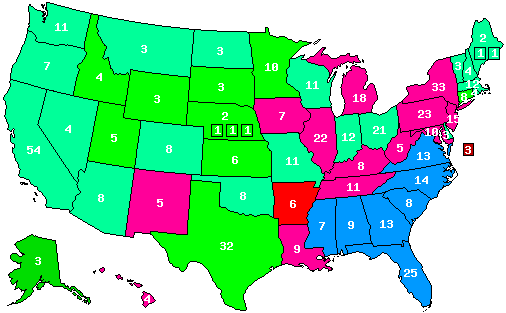
Perot wins in 1992.
Ross Perot/Adm. James Stockdale 39% PV, 270 Electoral Votes
Bill Clinton/Al Gore 30% PV, 179 Electoral Votes
George H.W Bush/ Dan Quayle 28.5% PV, 89 EV.
I'm working on a county map for this as well, I think I'll give Perot half of the counties where Clinton got less than 40% of the vote, and half of the counties where Bush got less than 40% of the vote.
Would not Maine be a darker green than that considering it was one of Perot's best states in OTL (as was Alaska which you do have in a dark green)?
Yeah, my bad. Alaska and Maine were both supposed to be Perot >50%.
Switching the popular vote total for each election since 2000:
2000 (R+0.51):
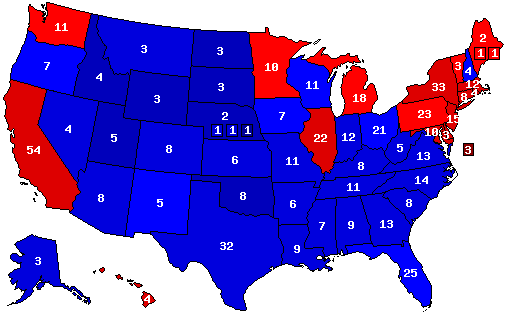
George W. Bush / Dick Cheney - 301 EV, 48.38%
Al Gore / Joe Lieberman - 237 EV, 47.87%
2004 (D+2.47):
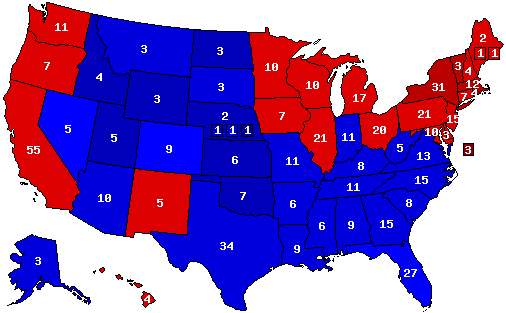
John Kerry / John Edwards - 284 EV, 50.73%
George W. Bush / Dick Cheney - 254 EV, 48.26%
2008 (R+7.26):

Barack Obama / Joe Biden - 278 EV, 45.60%
John McCain / Sarah Palin - 260 EV, 52.86%
2012 (R+3.86):
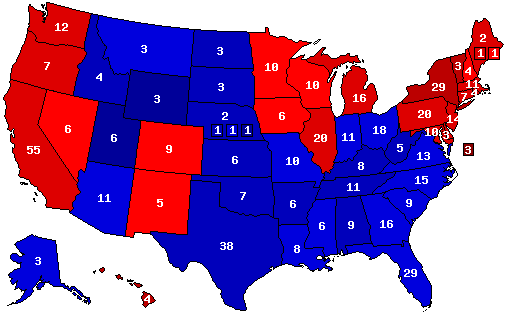
Barack Obama / Joe Biden - 272 EV, 47.15%
Mitt Romney / Paul Ryan - 266 EV, 51.01%
2016 (R+2.09):
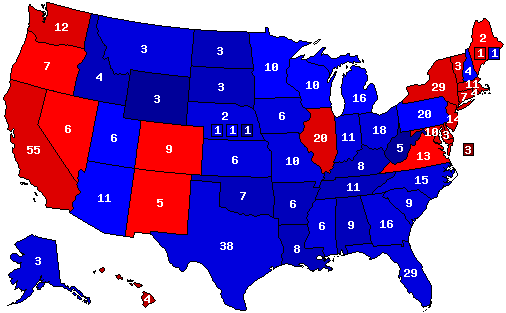
Donald Trump / Mike Pence - 320 EV, 48.03%
Hillary Clinton / Tim Kaine - 218 EV, 45.94%
I wouldn't be surprised if Republicans were vehemently opposed to the Electoral College in this scenario, considering a more than 7% PV in in '08 would equate to losing the EC by 18 EVs.
2000 (R+0.51):

George W. Bush / Dick Cheney - 301 EV, 48.38%
Al Gore / Joe Lieberman - 237 EV, 47.87%
2004 (D+2.47):

John Kerry / John Edwards - 284 EV, 50.73%
George W. Bush / Dick Cheney - 254 EV, 48.26%
2008 (R+7.26):

Barack Obama / Joe Biden - 278 EV, 45.60%
John McCain / Sarah Palin - 260 EV, 52.86%
2012 (R+3.86):

Barack Obama / Joe Biden - 272 EV, 47.15%
Mitt Romney / Paul Ryan - 266 EV, 51.01%
2016 (R+2.09):

Donald Trump / Mike Pence - 320 EV, 48.03%
Hillary Clinton / Tim Kaine - 218 EV, 45.94%
I wouldn't be surprised if Republicans were vehemently opposed to the Electoral College in this scenario, considering a more than 7% PV in in '08 would equate to losing the EC by 18 EVs.
Rhad
Banned
In 2008, 2012, and 2016, your calculations are for an even popular vote.Switching the popular vote total for each election since 2000:
2000 (R+0.51):

George W. Bush / Dick Cheney - 301 EV, 48.38%
Al Gore / Joe Lieberman - 237 EV, 47.87%
2004 (D+2.47):

John Kerry / John Edwards - 284 EV, 50.73%
George W. Bush / Dick Cheney - 254 EV, 48.26%
2008 (R+7.26):

Barack Obama / Joe Biden - 278 EV, 45.60%
John McCain / Sarah Palin - 260 EV, 52.86%
2012 (R+3.86):

Barack Obama / Joe Biden - 272 EV, 47.15%
Mitt Romney / Paul Ryan - 266 EV, 51.01%
2016 (R+2.09):

Donald Trump / Mike Pence - 320 EV, 48.03%
Hillary Clinton / Tim Kaine - 218 EV, 45.94%
I wouldn't be surprised if Republicans were vehemently opposed to the Electoral College in this scenario, considering a more than 7% PV in in '08 would equate to losing the EC by 18 EVs.
Rhad
Banned
Nope.All states where third parties got more than 'x' percent are left out of the Electoral College?
Rosa Luxemburg
Banned
Did they secede? Third party revolution?There's a reason those states are blank.
Threadmarks
View all 43 threadmarks
Reader mode
Reader mode
Recent threadmarks
Pericles-Obama landslide in 2008 Pericles-Obama does better in 2012 Tex Arkana-Carter runs a better campaign in 1976 and picks Frank Church as his running mate, winning in a landslide. DPKdebator-Trump landslide in 2016 wildviper121-Trump landslide based off of someone's Campaign trail game DPKdebator-The worst you can do as Hillary Clinton in the campaign trail game TheSaint1950-Last gallup poll in 1948 is right jonnguy2016-Trump self-sabotage- Status
- Not open for further replies.
Share: